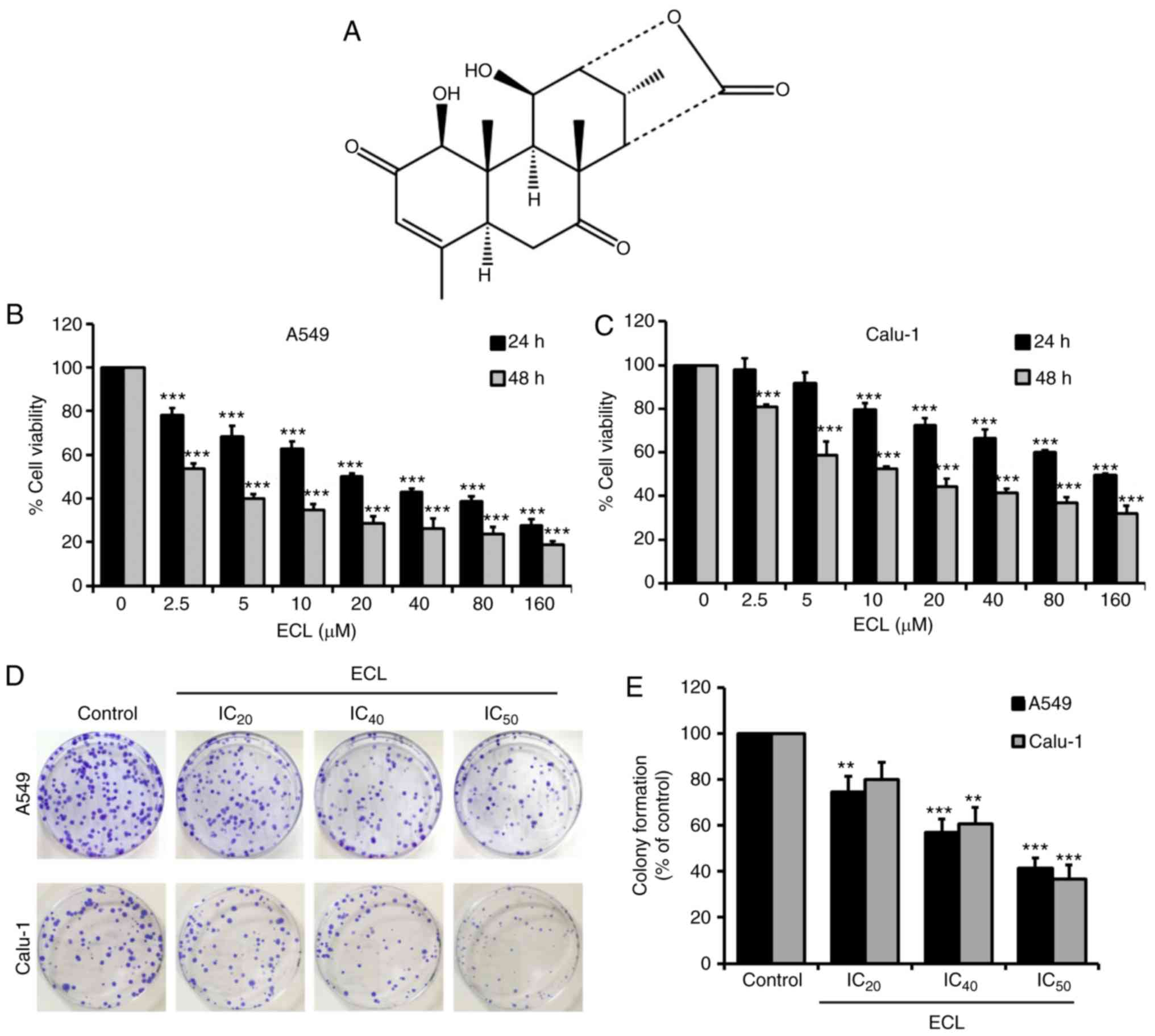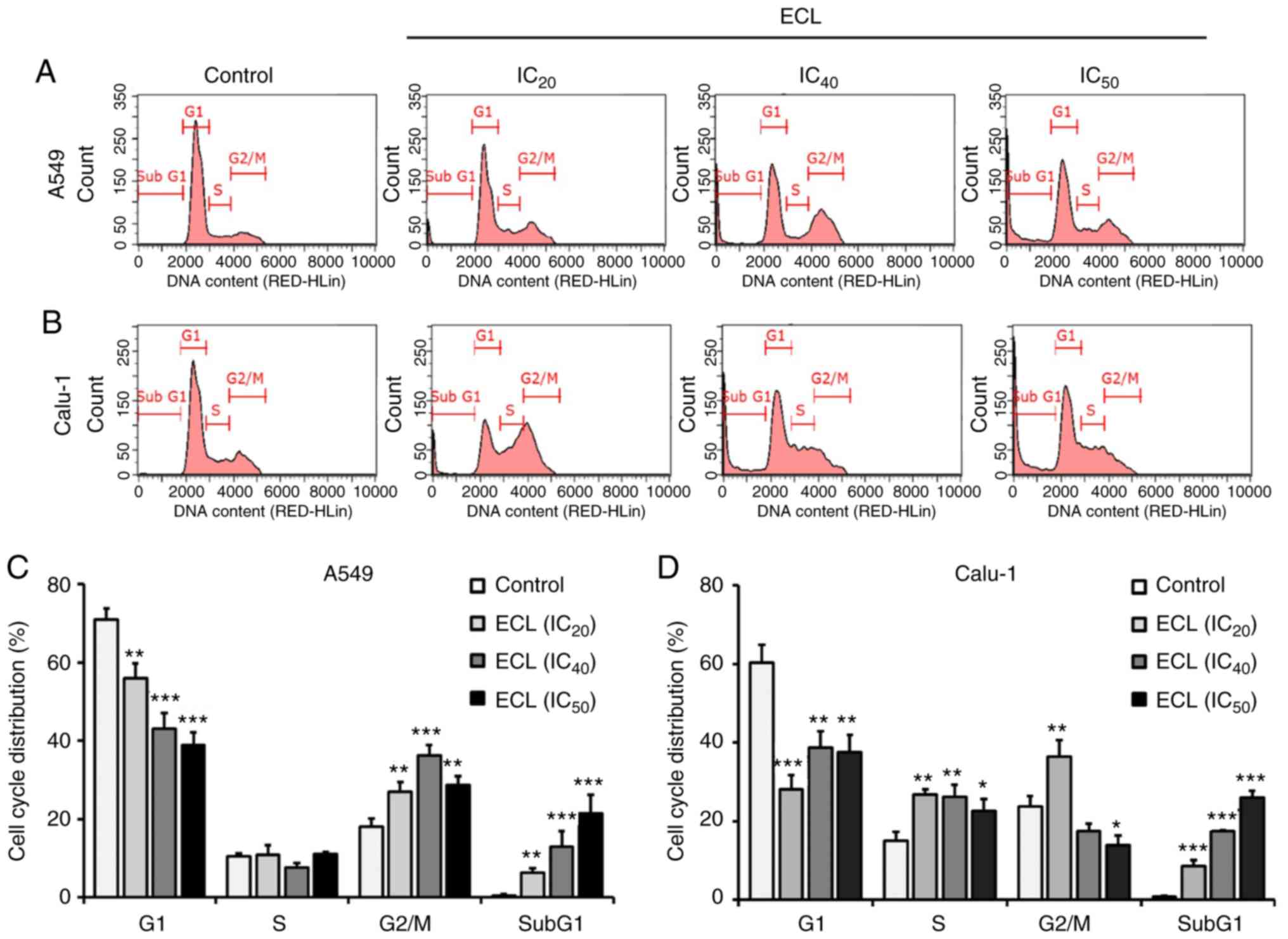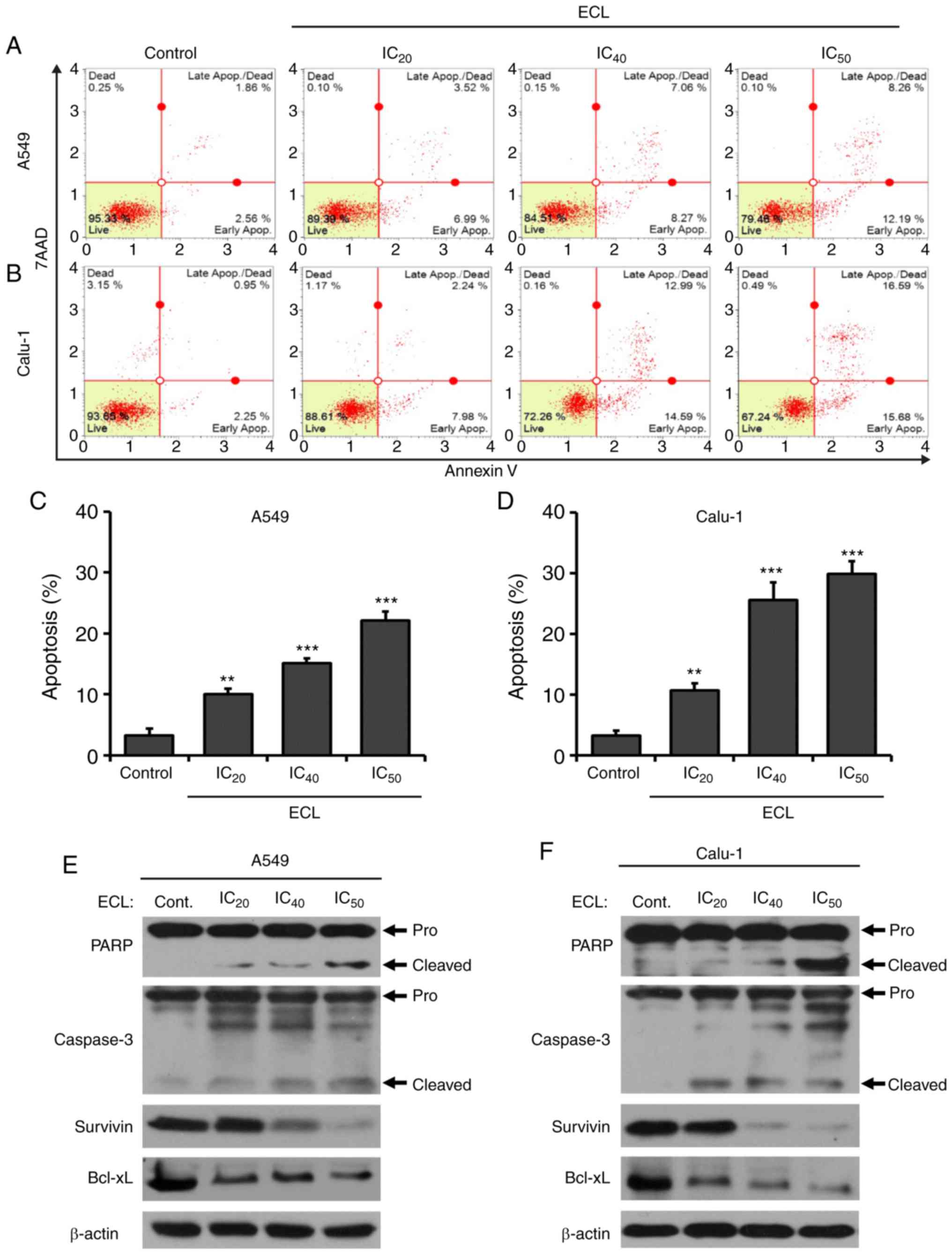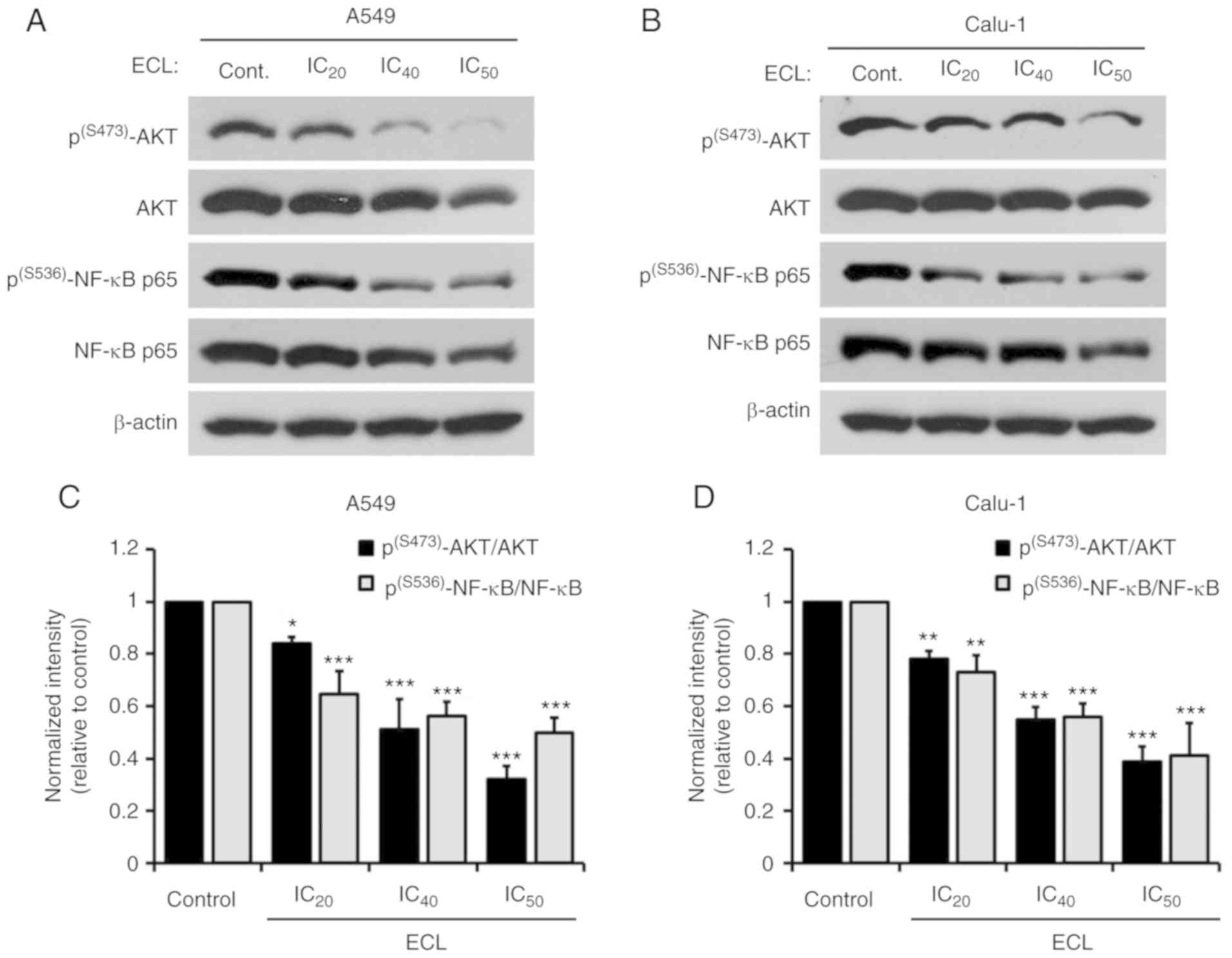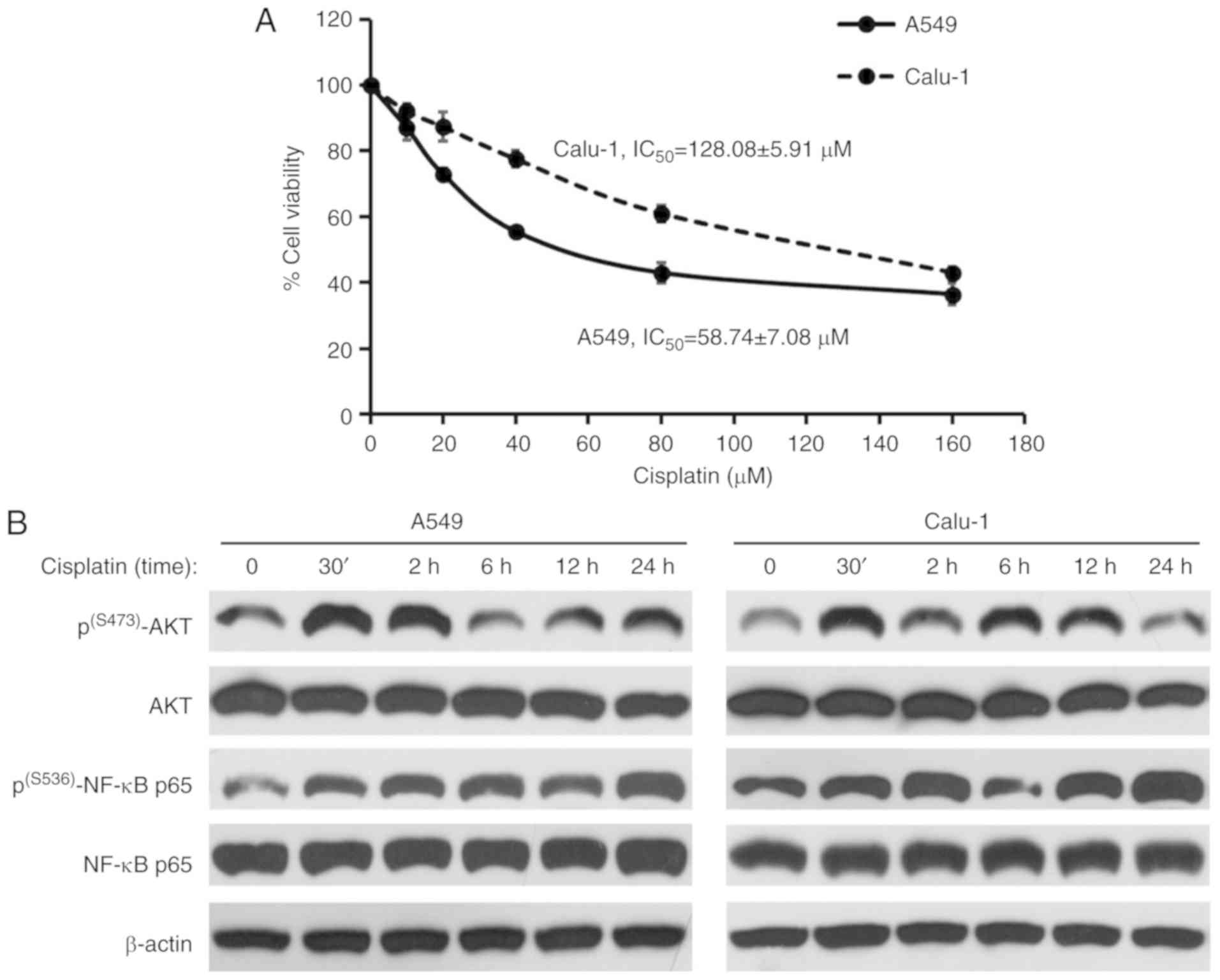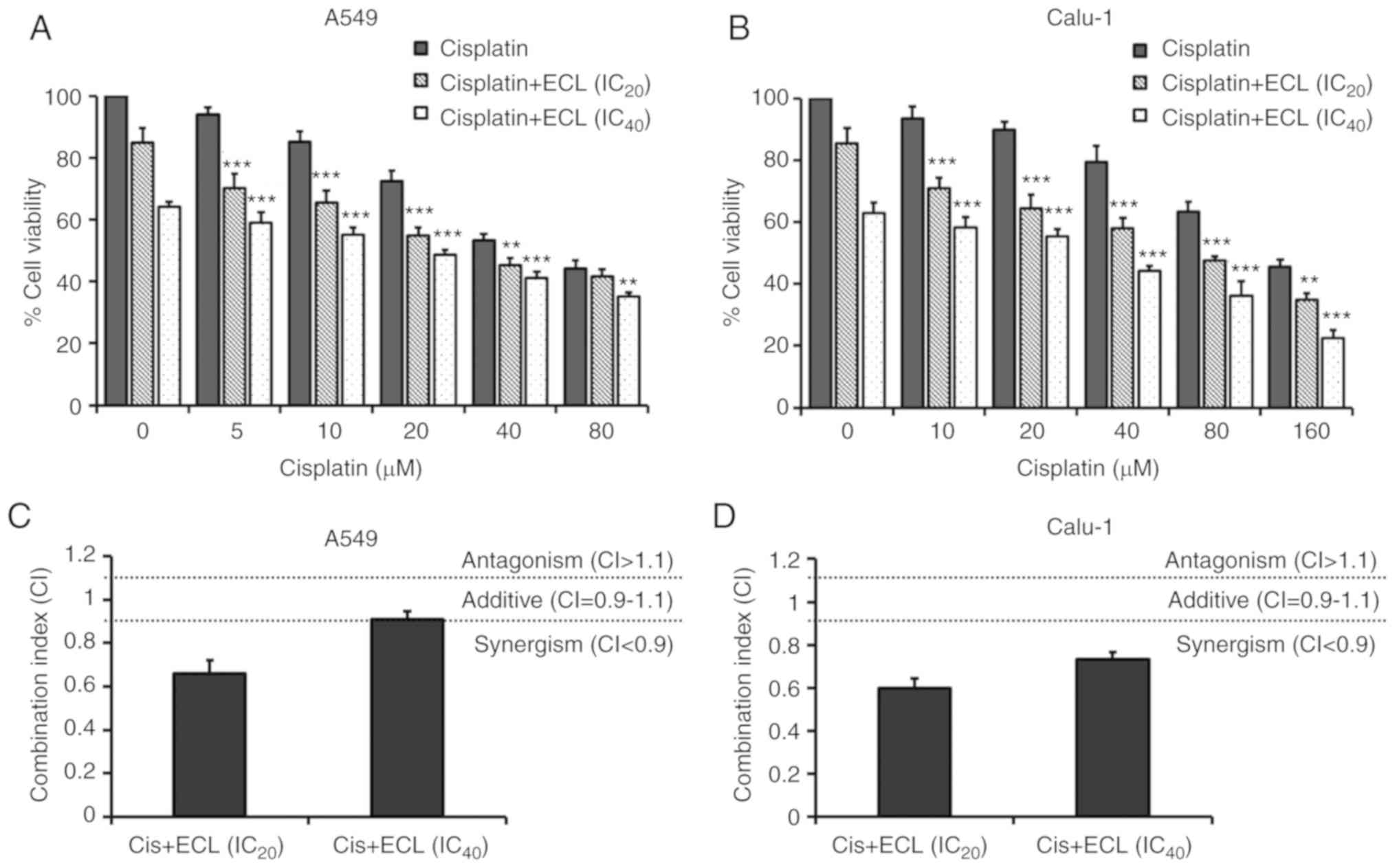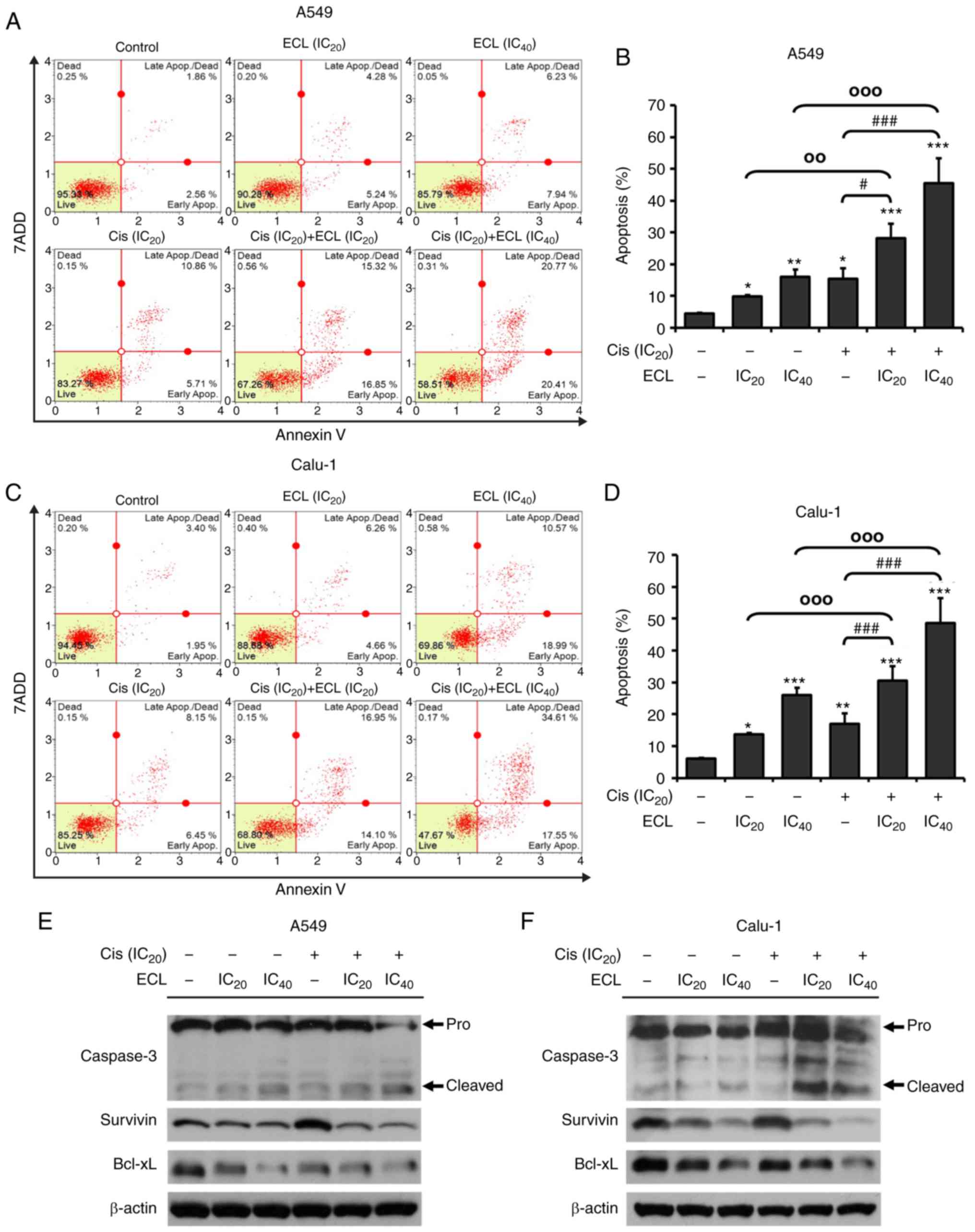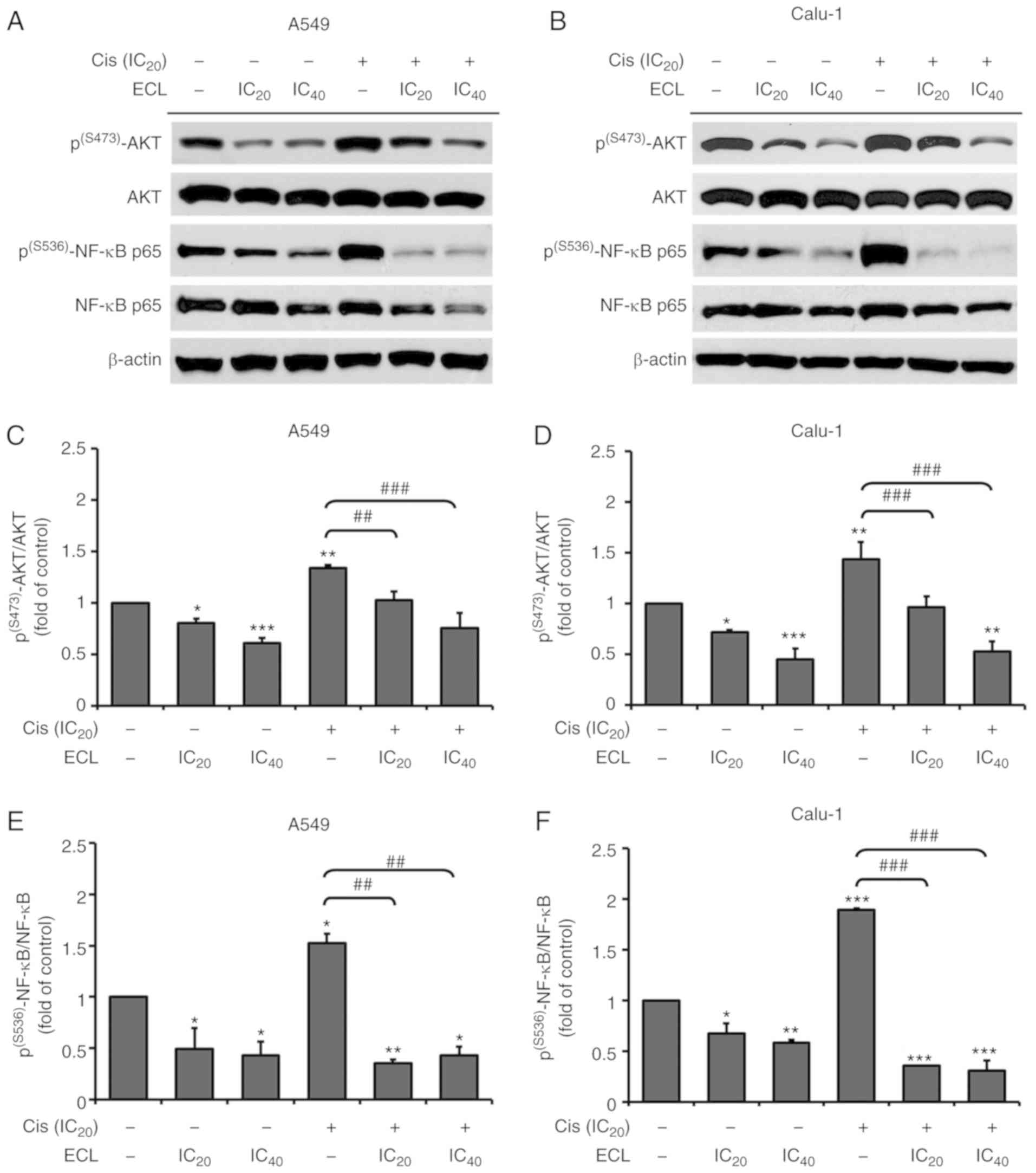|
1
|
Siegel RL, Miller KD and Jemal A: Cancer
statistics, 2018. CA Cancer J Clin. 68:7–30. 2018. View Article : Google Scholar : PubMed/NCBI
|
|
2
|
Liloglou T, Bediaga NG, Brown BR, Field JK
and Davies MP: Epigenetic biomarkers in lung cancer. Cancer Lett.
342:200–212. 2014. View Article : Google Scholar : PubMed/NCBI
|
|
3
|
D'Addario G, Pintilie M, Leighl NB, Feld
R, Cerny T and Shepherd FA: Platinum-based versus
non-platinum-based chemotherapy in advanced non-small-cell lung
cancer: A meta-analysis of the published literature. J Clin Oncol.
23:2926–2936. 2005. View Article : Google Scholar : PubMed/NCBI
|
|
4
|
Pei X, Xiao J, Wei G, Zhang Y, Lin F,
Xiong Z, Lu L, Wang X, Pang G, Jiang Y and Jiang L: Oenothein B
inhibits human non-small cell lung cancer A549cell proliferation by
ROS-mediated PI3K/Akt/NF-κB signaling pathway. Chem Biol Interact.
298:112–120. 2019. View Article : Google Scholar : PubMed/NCBI
|
|
5
|
Hafsi S, Pezzino FM, Candido S, Ligresti
G, Spandidos DA, Soua Z, McCubrey JA, Travali S and Libra M: Gene
alterations in the PI3K/PTEN/AKT pathway as a mechanism of
drug-resistance (review). Int J Oncol. 40:639–644. 2012.PubMed/NCBI
|
|
6
|
Hakan Kucuksayan H, Sakir Akgun S and Akca
H: Pl3K/Akt/NF-κB signalling pathway on NSCLC invasion. Med Chem.
6:42016.
|
|
7
|
Naugler WE and Karin M: NF-kappaB and
cancer-identifying targets and mechanisms. Curr Opin Genet Dev.
18:19–26. 2008. View Article : Google Scholar : PubMed/NCBI
|
|
8
|
Chen W, Liu X, Yuan S and Qiao T: HSPA12B
overexpression induces cisplatin resistance in non-small-cell lung
cancer by regulating the PI3K/Akt/NF-κB signaling pathway. Oncol
Lett. 15:3883–3889. 2018.PubMed/NCBI
|
|
9
|
Zou W, Ma X, Hua W, Chen B and Cai G:
Caveolin-1 mediates chemoresistance in cisplatin-resistant ovarian
cancer cells by targeting apoptosis through the Notch-1/Akt/NF-κB
pathway. Oncol Rep. 34:3256–3263. 2015. View Article : Google Scholar : PubMed/NCBI
|
|
10
|
Godwin P, Baird AM, Heavey S, Barr MP,
O'Byrne KJ and Gately K: Targeting nuclear factor-kappa B to
overcome resistance to chemotherapy. Front Oncol. 3:1202013.
View Article : Google Scholar : PubMed/NCBI
|
|
11
|
Albanell J, Chattopadhyay S, Tapia M,
Rovira A, Belda-Iniesta C, Manguán-García JDC, Machado R, Gonzalez
Barón M and Perona R: JNK/MKP-1 and PI3K/NF-κB: Critical pathways
controlling cellular response towards cisplatin in non-small cell
lung cancer (NSCLC). J Clin Oncol. 23:2033. 2005. View Article : Google Scholar
|
|
12
|
Nobili S, Lippi D, Witort E, Donnini M,
Bausi L, Mini E and Capaccioli S: Natural compounds for cancer
treatment and prevention. Pharmacol Res. 59:365–378. 2009.
View Article : Google Scholar : PubMed/NCBI
|
|
13
|
Li Y, Ahmed F, Ali S, Philip PA, Kucuk O
and Sarkar FH: Inactivation of nuclear factor kappaB by soy
isoflavone genistein contributes to increased apoptosis induced by
chemotherapeutic agents in human cancer cells. Cancer Res.
65:6934–6942. 2005. View Article : Google Scholar : PubMed/NCBI
|
|
14
|
Liu D, Yan L, Wang L, Tai W, Wang W and
Yang C: Genistein enhances the effect of cisplatin on the
inhibition of non-small cell lung cancer A549 cell growth in
vitro and in vivo. Oncol Lett. 8:2806–2810. 2014.
View Article : Google Scholar : PubMed/NCBI
|
|
15
|
Yu M, Qi B, Wu X, Xu J and Liu X:
Baicalein increases cisplatin sensitivity of A549 lung
adenocarcinoma cells via PI3K/Akt/NF-κB pathway. Biomed
Pharmacother. 90:677–685. 2017. View Article : Google Scholar : PubMed/NCBI
|
|
16
|
Ahmmed B, Khan MN, Nisar MA, Kampo S,
Zheng Q, Li Y and Yan Q: Tunicamycin enhances the suppressive
effects of cisplatin on lung cancer growth through PTX3
glycosylation via AKT/NF-kappaB signaling pathway. Int J Oncol.
54:431–442. 2019.PubMed/NCBI
|
|
17
|
Miyake K, Tezuka Y, Awale S, Li F and
Kadota S: Quassinoids from Eurycoma longifolia. J Nat Prod.
72:2135–2140. 2009. View Article : Google Scholar : PubMed/NCBI
|
|
18
|
Rehman SU, Choe K and Yoo HH: Review on a
traditional herbal medicine, Eurycoma longifolia Jack (tongkat
ali): Its traditional uses, chemistry, evidence-based pharmacology
and toxicology. Molecules. 21:3312016. View Article : Google Scholar : PubMed/NCBI
|
|
19
|
Kuo PC, Damu AG, Lee KH and Wu TS:
Cytotoxic and antimalarial constituents from the roots of Eurycoma
longifolia. Bioorg Med Chem. 12:537–544. 2004. View Article : Google Scholar : PubMed/NCBI
|
|
20
|
Miyake K, Li F, Tezuka Y, Awale S and
Kadota S: Cytotoxic activity of quassinoids from Eurycoma
longifolia. Nat Prod Commun. 5:1009–1012. 2010.PubMed/NCBI
|
|
21
|
Dukaew N, Konishi T, Chairatvit K,
Autsavapromporn N, Soonthornchareonnon N and Wongnoppavich A:
Enhancement of radiosensitivity by eurycomalactone in human NSCLC
cells through G2/M cell cycle arrest and delayed DNA double-strand
break repair. Oncol Res. 28:161–175. 2020. View Article : Google Scholar : PubMed/NCBI
|
|
22
|
Tran TV, Malainer C, Schwaiger S, Atanasov
AG, Heiss EH, Dirsch VM and Stuppner H: NF-κB inhibitors from
Eurycoma longifolia. J Nat Prod. 77:483–488. 2014. View Article : Google Scholar : PubMed/NCBI
|
|
23
|
Malainer C, Schachner D, Sangiovanni E,
Atanasov AG, Schwaiger S, Stuppner H, Heiss EH and Dirsch VM:
Eurycomalactone inhibits expression of endothelial adhesion
molecules at a post-transcriptional level. J Nat Prod.
80:3186–3193. 2017. View Article : Google Scholar : PubMed/NCBI
|
|
24
|
Phannasorn W, Khanaree C, Wongnoppavich A
and Chewonarin T: The effect of purple rice (Oryza sativa L.
indica) extract on the inflammatory response in a colon cancer cell
line and dextran sulfate-induced tumor promotion in the rat colon.
Mol Cell Toxicol. 13:433–442. 2017. View Article : Google Scholar
|
|
25
|
Peters GJ, van der Wilt CL, van Moorsel
CJ, Kroep JR, Bergman AM and Ackland SP: Basis for effective
combination cancer chemotherapy with antimetabolites. Pharmacol
Ther. 87:227–253. 2000. View Article : Google Scholar : PubMed/NCBI
|
|
26
|
Chou TC: Drug combination studies and
their synergy quantification using the Chou-Talalay method. Cancer
Res. 70:440–446. 2010. View Article : Google Scholar : PubMed/NCBI
|
|
27
|
Wongnoppavich A, Dukaew N, Choonate S and
Chairatvit K: Upregulation of maspin expression in human cervical
carcinoma cells by transforming growth factor beta1 through the
convergence of Smad and non-Smad signaling pathways. Oncol Lett.
13:3646–3652. 2017. View Article : Google Scholar : PubMed/NCBI
|
|
28
|
Kaltschmidt C, Banz-Jansen C, Benhidjeb T,
Beshay M, Förster C, Greiner J, Hamelmann E, Jorch N, Mertzlufft F,
Pfitzenmaier J, et al: A role for NF-κB in organ specific cancer
and cancer stem cells. Cancers (Basel). 11:6552019. View Article : Google Scholar
|
|
29
|
Huang WC and Hung MC: Induction of Akt
activity by chemotherapy confers acquired resistance. J Formos Med
Assoc. 108:180–194. 2009. View Article : Google Scholar : PubMed/NCBI
|
|
30
|
Liao Y and Hung MC: Physiological
regulation of Akt activity and stability. Am J Transl Res. 2:19–42.
2010.PubMed/NCBI
|
|
31
|
Hu J, Nakano H, Sakurai H and Colburn NH:
Insufficient p65 phosphorylation at S536 specifically contributes
to the lack of NF-kappaB activation and transformation in resistant
JB6 cells. Carcinogenesis. 25:1991–2003. 2004. View Article : Google Scholar : PubMed/NCBI
|
|
32
|
Barta JA, Powell CA and Wisnivesky JP:
Global epidemiology of lung cancer. Ann Glob Health. 85:82019.
View Article : Google Scholar : PubMed/NCBI
|
|
33
|
Ijaz S, Akhtar N, Khan MS, Hameed A, Irfan
M, Arshad MA, Ali S and Asrar M: Plant derived anticancer agents: A
green approach towards skin cancers. Biomed Pharmacother.
103:1643–1651. 2018. View Article : Google Scholar : PubMed/NCBI
|
|
34
|
Wong PF, Cheong WF, Shu MH, Teh CH, Chan
KL and AbuBakar S: Eurycomanone suppresses expression of lung
cancer cell tumor markers, prohibitin, annexin 1 and endoplasmic
reticulum protein 28. Phytomedicine. 19:138–144. 2012. View Article : Google Scholar : PubMed/NCBI
|
|
35
|
Zakaria Y, Rahmat A, Pihie AH, Abdullah NR
and Houghton PJ: Eurycomanone induce apoptosis in HepG2 cells via
up- regulation of p53. Cancer Cell Int. 9:162009. View Article : Google Scholar : PubMed/NCBI
|
|
36
|
Hajjouli S, Chateauvieux S, Teiten MH,
Orlikova B, Schumacher M, Dicato M, Choo CY and Diederich M:
Eurycomanone and eurycomanol from Eurycoma longifolia Jack as
regulators of signaling pathways involved in proliferation, cell
death and inflammation. Molecules. 19:14649–14666. 2014. View Article : Google Scholar : PubMed/NCBI
|
|
37
|
Tokunaga E, Oki E, Egashira A, Sadanaga N,
Morita M, Kakeji Y and Maehara Y: Deregulation of the Akt pathway
in human cancer. Curr Cancer Drug Targets. 8:27–36. 2008.
View Article : Google Scholar : PubMed/NCBI
|
|
38
|
Bai D, Ueno L and Vogt PK: Akt-mediated
regulation of NFkappaB and the essentialness of NFkappaB for the
oncogenicity of PI3K and Akt. Int J Cancer. 125:2863–2870. 2009.
View Article : Google Scholar : PubMed/NCBI
|
|
39
|
Oeckinghaus A and Ghosh S: The NF-kappaB
family of transcription factors and its regulation. Cold Spring
Harb Perspect Biol. 1:a0000342009. View Article : Google Scholar : PubMed/NCBI
|
|
40
|
Chen W, Li Z, Bai L and Lin Y: NF-kappaB
in lung cancer, a carcinogenesis mediator and a prevention and
therapy target. Front Biosci (Landmark Ed). 16:1172–1185. 2011.
View Article : Google Scholar : PubMed/NCBI
|
|
41
|
Umemura S, Mimaki S, Makinoshima H, Tada
S, Ishii G, Ohmatsu H, Niho S, Yoh K, Matsumoto S, Takahashi A, et
al: Therapeutic priority of the PI3K/AKT/mTOR pathway in small cell
lung cancers as revealed by a comprehensive genomic analysis. J
Thorac Oncol. 9:1324–1331. 2014. View Article : Google Scholar : PubMed/NCBI
|
|
42
|
Garcia-Echeverria C and Sellers WR: Drug
discovery approaches targeting the PI3K/Akt pathway in cancer.
Oncogene. 27:5511–5526. 2008. View Article : Google Scholar : PubMed/NCBI
|
|
43
|
Gu JJ, Qiao KS, Sun P, Chen P and Li Q:
Study of EGCG induced apoptosis in lung cancer cells by inhibiting
PI3K/Akt signaling pathway. Eur Rev Med Pharmacol Sci.
22:4557–4563. 2018.PubMed/NCBI
|
|
44
|
Li JY, Yu J, Du XS, Zhang HM, Wang B, Guo
H, Bai J, Wang JH, Liu A and Wang YL: Safflower polysaccharide
induces NSCLC cell apoptosis by inhibition of the Akt pathway.
Oncol Rep. 36:147–154. 2016. View Article : Google Scholar : PubMed/NCBI
|
|
45
|
Kwon HJ, Choi GE, Ryu S, Kwon SJ, Kim SC,
Booth C, Nichols KE and Kim HS: Stepwise phosphorylation of p65
promotes NF-κB activation and NK cell responses during target cell
recognition. Nat Commun. 7:116862016. View Article : Google Scholar : PubMed/NCBI
|
|
46
|
Zheng J, Son DJ, Gu SM, Woo JR, Ham YW,
Lee HP, Kim WJ, Jung JK and Hong JT: Piperlongumine inhibits lung
tumor growth via inhibition of nuclear factor kappa B signaling
pathway. Sci Rep. 6:263572016. View Article : Google Scholar : PubMed/NCBI
|
|
47
|
Khan KH, Yap TA, Yan L and Cunningham D:
Targeting the PI3K-AKT-mTOR signaling network in cancer. Chin J
Cancer. 32:253–265. 2013. View Article : Google Scholar : PubMed/NCBI
|
|
48
|
Shukla S, Shankar E, Fu P, MacLennan GT
and Gupta S: Suppression of NF-κB and NF-κB-regulated gene
expression by apigenin through IκBα and IKK pathway in TRAMP mice.
PLoS One. 10:e01387102015. View Article : Google Scholar : PubMed/NCBI
|
|
49
|
Cheung CH, Huang CC, Tsai FY, Lee JY,
Cheng SM, Chang YC, Huang YC, Chen SH and Chang JY:
Survivin-biology and potential as a therapeutic target in oncology.
Onco Targets Ther. 6:1453–1462. 2013. View Article : Google Scholar : PubMed/NCBI
|
|
50
|
Rinaldi M, Cauchi C and Gridelli C: First
line chemotherapy in advanced or metastatic NSCLC. Ann Oncol. 17
(Suppl 5):v64–v67. 2006. View Article : Google Scholar : PubMed/NCBI
|
|
51
|
Galluzzi L, Senovilla L, Vitale I, Michels
J, Martins I, Kepp O, Castedo M and Kroemer G: Molecular mechanisms
of cisplatin resistance. Oncogene. 31:1869–1883. 2012. View Article : Google Scholar : PubMed/NCBI
|
|
52
|
Köberle B, Tomicic MT, Usanova S and Kaina
B: Cisplatin resistance: Preclinical findings and clinical
implications. Biochim Biophys Acta. 1806:172–182. 2010.PubMed/NCBI
|
|
53
|
Baby J, Pickering BF, Vashisht Gopal YN
and Van Dyke MW: Constitutive and inducible nuclear factor-kappaB
in immortalized normal human bronchial epithelial and non-small
cell lung cancer cell lines. Cancer Lett. 255:85–94. 2007.
View Article : Google Scholar : PubMed/NCBI
|
|
54
|
Chen B, Shen Z, Wu D, Xie X, Xu X, Lv L,
Dai H, Chen J and Gan X: Glutathione peroxidase 1 promotes NSCLC
resistance to cisplatin via ROS-induced activation of PI3K/AKT
pathway. Biomed Res Int. 2019:76405472019.PubMed/NCBI
|
|
55
|
Li Z, Yang Z, Lapidus RG, Liu X, Cullen KJ
and Dan HC: IKK phosphorylation of NF-κB at serine 536 contributes
to acquired cisplatin resistance in head and neck squamous cell
cancer. Am J Cancer Res. 5:3098–3110. 2015.PubMed/NCBI
|















